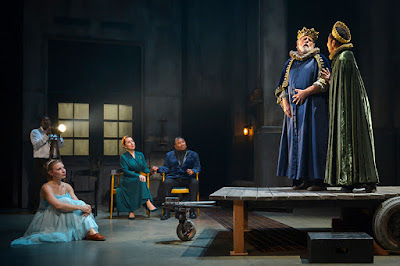Double Identity: Hamlet's Avenging Sons
By Elspeth Sweatman
In Hamlet, Shakespeare uses doubling—the mirroring of characters, situations, plot points, themes, and rhetorical devices—to make his characters and the world of Elsinore more intriguing and explore the themes of identity, power, and truth at the heart of the play. One of the more noticeable uses of this device is that there isn’t just one man in the play avenging his father’s death; there are three.
The addition of Laertes and Fortinbras also makes Shakespeare’s protagonist more multifaceted and emphasizes one important theme in the play: identity. Hamlet is Hamlet because of the choices he makes when confronted with the news of his father’s murder. Hamlet is a charismatic, dynamic prince; he could have raised an army, as Fortinbras does, and deposed his uncle through force and rhetoric. But Hamlet is not just driven by a desire to right a wrong, but by a desire for the truth. He wants to be certain that Claudius did in fact kill his father. Only then will he act. This choice—to seek the truth rather than take immediate action—sets him apart from the other two avenging sons and makes him a much more complex and nuanced character than the heroes of other seventeenth-century revenge tragedies.
A.C.T.’s production of Hamlet ends this Sunday, October 15, at The Geary Theater. Click here to purchase tickets through our website. To read more about doubling in Shakespeare’s Hamlet, order a copy of Words on Plays, A.C.T.'s in-depth performance guide series.
In Hamlet, Shakespeare uses doubling—the mirroring of characters, situations, plot points, themes, and rhetorical devices—to make his characters and the world of Elsinore more intriguing and explore the themes of identity, power, and truth at the heart of the play. One of the more noticeable uses of this device is that there isn’t just one man in the play avenging his father’s death; there are three.
 |
| Hamlet (John Douglas Thompson) presents a play about murder to the court. Photo by Kevin Berne. |
Hamlet, Laertes, and Fortinbras all lose their fathers: Hamlet at the hands of his uncle Claudius, Laertes at the hands of Hamlet, and Fortinbras at the hands of Hamlet’s father. Although all three vow to avenge their fathers’ deaths, they go about accomplishing this task in completely different ways. Hamlet gathers evidence of his uncle’s guilt before acting. Laertes returns from France immediately and demands to know who killed his father; he is only stalled in his quest for vengeance by his grief at his sister’s death and Claudius’s urgings to wait for an opportune moment. And Fortinbras raises an army to reconquer the territory his father lost to Hamlet’s father before the start of the play.
By surrounding Hamlet with other sons avenging their fathers’ deaths, Shakespeare intensifies the latter half of Hamlet, as the audience wonders which avenging son will accomplish his mission first. Will it be Fortinbras with his assembled masses marching on Elsinore? Will it be Hamlet, who has arguably had the most time and opportunity to exact his revenge? Or will it be Laertes, whose anger is profoundly mixed with grief?
 |
| Hamlet (John Douglas Thompson) considers murdering a praying Claudius (Steven Anthony Jones). Photo by Kevin Berne. |
A.C.T.’s production of Hamlet ends this Sunday, October 15, at The Geary Theater. Click here to purchase tickets through our website. To read more about doubling in Shakespeare’s Hamlet, order a copy of Words on Plays, A.C.T.'s in-depth performance guide series.

